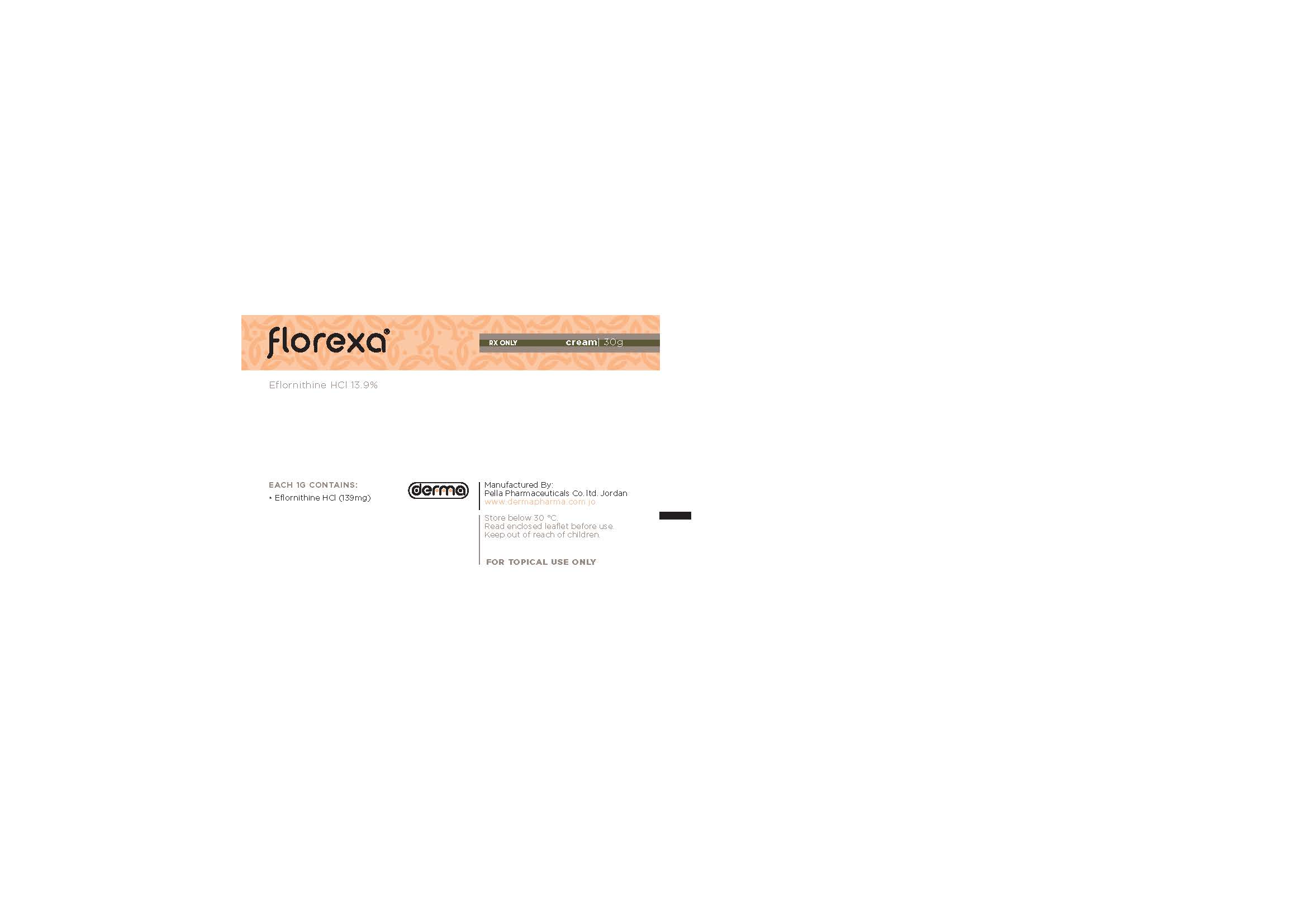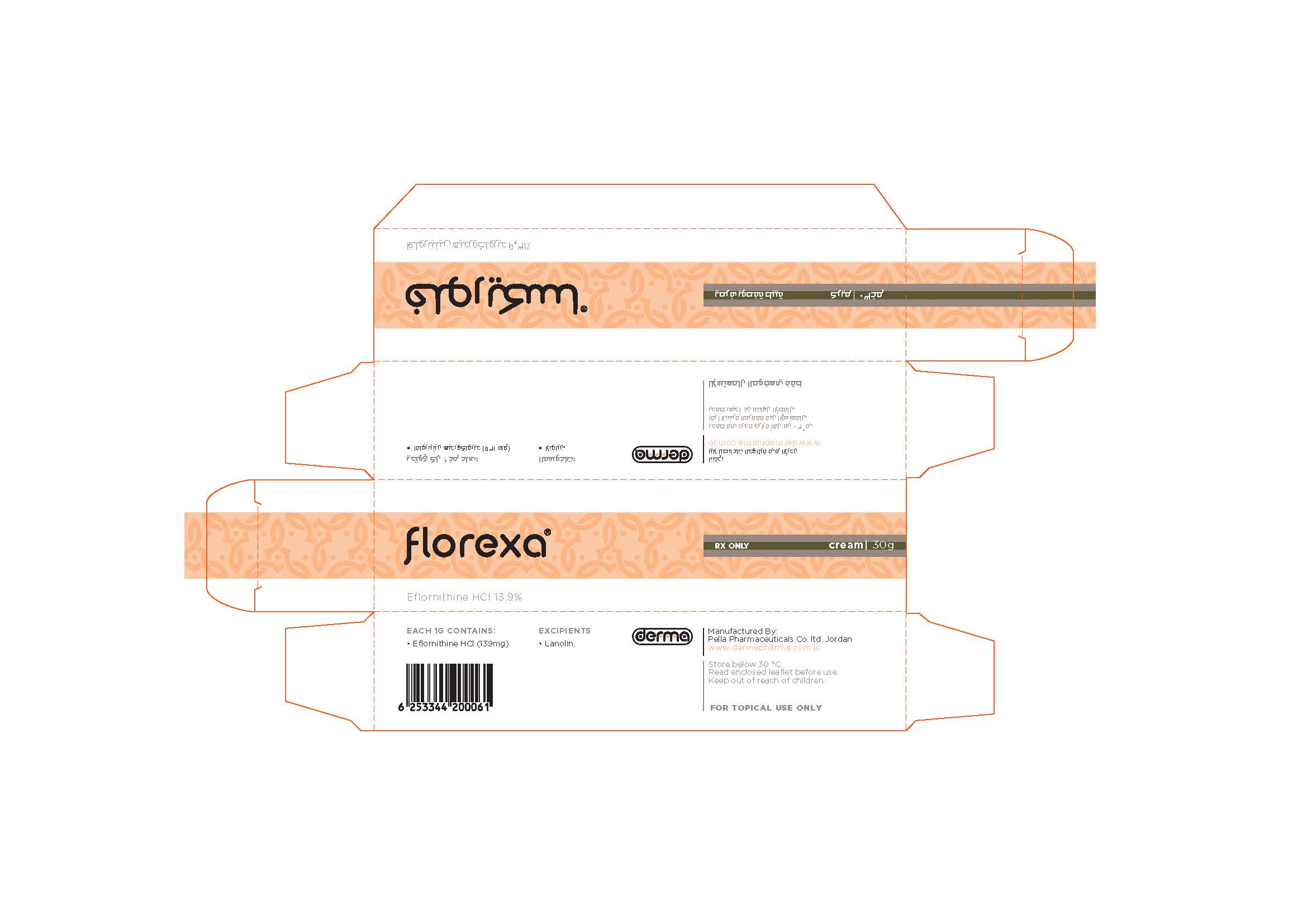Florexa Cream Prescribing Information
Package insert / product label
Generic name: eflornithine hydrochloride
Dosage form: cream
Drug class: Miscellaneous topical agents
Medically reviewed by Drugs.com. Last updated on Jan 2, 2024.
On This Page
Composition
Each 1 g contains: Eflornithine hydrochloride 139 mg.
Excipients: Ceteareth-25, Cetostearyl alcohol, Lanolin, Glyceryl monostearate, mineral oil, Cetyl alcohol, Methyl Paraben, Emulsifying wax, Dimethicone, and Purified Water.
Florexa Cream Description
Florexa is a prescribed medication applied to the skin for the reduction of unwanted facial hair in women.
There are no studies examining the inhibition of the enzyme ornithine decarboxylase (ODC) in human skin following the application of topical eflornithine. However, there are studies in the literature that report the inhibition of ODC activity in skin following oral eflornithine. It is postulated that topical eflornithine hydrochloride irreversibly inhibits skin ODC activity. This enzyme is necessary in the synthesis of polyamines. Animal data indicate that inhibition of ornithine decarboxylase inhibits cell division and synthetic functions, which affect the rate of hair growth. Eflornithine hydrochloride Cream 13.9% has been shown to retard the rate of hair growth in non-clinical and clinical studies.
Indications and Usage for Florexa Cream
Florexa is indicated for the reduction of unwanted facial hair in women. Florexa has only been studied on the face and adjacent involved areas under the chin of affected individuals. Usage should be limited to these areas of involvement.
Contraindications
Eflomithine HCl is contraindicated in patients with a history of sensitivity to any components of the preparation.
Children less than 12 years of age shouldn't use
Florexa.
Precautions
For external use only.
Transient stinging or burning may occur when applied to abraded or broken skin.
Pregnancy
Because there are no adequate and well-controlled studies in pregnant women, the risk / benefit ratio of using eflornithine HCl in women with unwanted facial hair who are pregnant should be weighed carefully with serious consideration for either not implementing or discontinuing use of Florexa.
Drug Interactions
It is not known if Eflornithine HCl has any interaction with other topically applied drug products.
Florexa Cream Dosage and Administration
Apply a thin layer of Florexa, to wanted areas of the face and adjacent involved areas under the chin and rub in thoroughly. Do not wash treated area for at least 4 hours. Use twice daily at least 8 hours apart or as directed by a physician. The patient should continue to use hair removal techniques as needed in conjunction with Florexa. ( Florexa should be applied at least 5 minutes after hair removal.) Cosmetics or sunscreens may be applied over treated areas; you should wait a few minutes to allow the treatment to be absorbed.
Florexa doesn't permanently remove hair or "cure" unwanted facial hair. It is not a depilatory. Your treatment program should include continuation of any hair removal technique you are currently using.
Florexa will help you manage your condition and improve your appearance.
Improvement in the condition occurs gradually. Don't be discouraged if you see no immediate improvement. Be patient. Improvement may be seen as early as 4 to 8 weeks of treatment. Improvement may take longer in some individuals. If no improvement is seen after 6 months of use; discontinue use.
Adverse Reactions/Side Effects
The following side effects have been reported
Acne, Pseudofolliculitis Barbae, Stinging Skin, Headache, Burning Skin, Dry Skin, Pruritus (itching), Erythema (redness), Tingling Skin, Dyspepsia, skin irritation, rash, alopecia, dizziness, folliculitis, hair ingrown, facial edema, anorexia, nausea, asthenia, vertigo.
THIS IS A MEDICAMENT
- Medicament is a product which affects your health and its consumption contrary to instructions is dangerous for you.
- Strictly follow the doctor's prescription, the method of use and the instruction of the pharmacist who sold the medicament.
- The doctor and the pharmacist are experts in medicine, its benefits and risks.
- Do not by yourself interrupt the period of treatment prescribed for you.
Do not repeat the same prescription without consulting your doctor.
- Keep medicament out of reach of children.
| FLOREXA
eflornithine hydrochloride cream |
||||||||||||||||||||
|
||||||||||||||||||||
|
||||||||||||||||||||
|
||||||||||||||||||||
|
||||||||||||||||||||
|
||||||||||||||||||||
| Labeler - Pella Pharmaceuticals Co. Ltd (562370925) |
More about Florexa (eflornithine topical)
- Compare alternatives
- Side effects
- Dosage information
- During pregnancy
- Drug class: miscellaneous topical agents
- Breastfeeding


